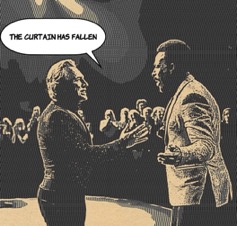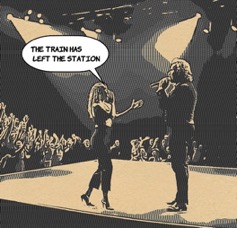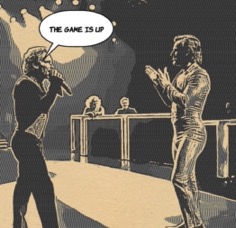The phrase ‘Elvis has left the building’ is one of the most iconic idioms in the English language, used universally to indicate that the main event is over and it’s time to go.
As with any well-known idiom, various other turns of phrase have cropped up over time that carry a similar meaning without directly copying the King of Rock and Roll.
Here are 10 alternative expressions people have started using when they want to convey that the show or occasion is wrapping up without explicitly saying the now-legendary phrase made famous by Elvis Presley.
10 Phrases Similar to Elvis Has Left The Building
1. The show is over
‘The show is over’ is a phrase that can be used as an alternative to the idiom ‘Elvis has left the building’ to convey the same meaning.
This phrase signifies the end of an event, performance, or activity. When a show or event concludes, and there are no further proceedings or performances, one can use this phrase to inform others that it has come to an end.
Just like Elvis leaving the building indicated that there was nothing more to see or expect, saying ‘the show is over’ conveys the same notion that there are no further actions or events to anticipate.
2. The curtain has fallen
‘The curtain has fallen’ is another expression that can be used interchangeably with the idiom ‘Elvis has left the building.’
This phrase refers to the moment when the curtain on a stage is lowered, signaling the end of a theatrical performance.
When the curtain falls, it signifies that the actors have exited the stage and there will be no more acts or scenes to follow.
Similarly, when Elvis left the building, it signified that his performance had concluded and there was nothing more to come.

Hence, using ‘the curtain has fallen’ as an alternative phrase captures the sense of finality and absence of further activity.
3. It’s a wrap
‘It’s a wrap’ is a colloquial phrase often used in the film and television industry to signify the completion of a scene, shooting, or an entire project.
This phrase can be employed as a substitute for the idiom ‘Elvis has left the building’ as it conveys the idea that everything has been finished or concluded.
When something is ‘a wrap,’ it means that all necessary actions have been taken, and there is no more work to be done.
Just like Elvis leaving the building indicated the end of his presence, saying ‘It’s a wrap’ implies that there is no more to be done or expected.
4. The fat lady has sung
‘The fat lady has sung’ is a phrase that can be used instead of the idiom ‘Elvis has left the building’ to convey a similar meaning.
It is often used to indicate that a particular event or situation has come to an end or reached its conclusion. This phrase originated from the world of opera, where the final act often involves a dramatic soprano singing a powerful aria to signify the end of the performance.
In a broader context, it suggests that there is no more to be said or done, and the outcome is final.
5. The party is over
‘The party is over’ is a phrase that can be used instead of the idiom ‘Elvis has left the building’ to convey the same meaning. Both expressions signify the end of an event or a situation.
While ‘Elvis has left the building’ specifically refers to the departure of a significant individual, such as a performer or a key figure, ‘The party is over’ has a broader application and can refer to the conclusion of any enjoyable or exciting gathering or occasion.
‘The party is over’ is often used metaphorically to indicate that a particular moment or phase has come to an end, and it’s time to move on.
It suggests that the excitement, energy, or enthusiasm that characterized the event has dissipated, and it’s time to wrap things up or bid farewell.
6. The lights are out
‘The lights are out’ is another phrase that can be used instead of the idiom ‘Elvis has left the building’ to convey a similar meaning.
Both expressions imply the departure or absence of someone or something significant, resulting in a change in the atmosphere or situation.
While ‘Elvis has left the building’ is specifically associated with the departure of Elvis Presley after a performance, ‘The lights are out’ is a more general expression that can apply to any situation where a notable person or element is no longer present.
When we say ‘The lights are out,’ we are metaphorically indicating that a particular event or situation has reached its conclusion or that a central figure has departed.
7. The train has left the station
‘The train has left the station’ is a phrase that can be used in place of the idiom ‘Elvis has left the building’ to convey a similar meaning.
Both expressions imply that a crucial moment has passed, and there’s no going back or changing the course of events.
While ‘Elvis has left the building’ focuses on the departure of Elvis Presley and the resulting finality of a performance, ‘The train has left the station’ is a more general phrase that signifies the irreversible start or progression of something.
When we say ‘The train has left the station,’ we are using a metaphorical expression to indicate that a critical opportunity or moment has passed, and it’s too late to alter or influence the outcome.

8. The ship has sailed
The phrase ‘The ship has sailed’ is a popular idiom that can be used as an alternative to ‘Elvis has left the building.’ It conveys the same meaning as a missed opportunity or the realization that something is no longer possible.
Just like the original idiom, ‘The ship has sailed’ implies that a particular chance or moment has passed and cannot be revisited.
This phrase draws its metaphorical meaning from the image of a ship departing from a dock. Once the ship has set sail, it becomes increasingly difficult, if not impossible, to catch up to it or board it.
In the same way, when we say ‘The ship has sailed,’ we imply that an opportunity has passed, and there is no point in pursuing it any longer.
Whether it refers to a business venture, a romantic relationship, or any other situation, using the phrase ‘The ship has sailed’ effectively communicates that the chance for a desired outcome has elapsed.
9. The cake is baked
Another phrase that can be used interchangeably with ‘Elvis has left the building’ is ‘The cake is baked.’ This idiom signifies that a particular situation or outcome has reached its conclusion and cannot be changed.
It suggests that the desired result has been achieved or the irreversible process has taken place.
The phrase ‘The cake is baked’ draws its analogy from the process of baking a cake. Once the cake is fully baked, it cannot be undone or altered.
Similarly, when we say ‘The cake is baked,’ we imply that a decision has been made, an event has occurred, or a plan has been executed, and there is no turning back.
10. The game is up
‘The game is up’ is a phrase that can be used synonymously with ‘Elvis has left the building.’ It implies that a particular situation or deception has been exposed, and there is no way to continue or deceive further.
Similar to the original idiom, ‘The game is up’ signifies the end of an act or the revelation of the truth.
The phrase ‘The game is up’ originates from the world of sports, where the term ‘game’ refers to a competition or a strategy.
When we say ‘The game is up,’ we mean that the competition or deception has been uncovered, and there is no point in continuing or trying to deceive others.

Final Thoughts
The idiom ‘Elvis has left the building’ may be iconic, but it is always refreshing to explore new expressions and expand our linguistic horizons.
We have explored 15 phrases that can be used as alternatives to the iconic idiom ‘Elvis has left the building.’ These phrases not only convey the same meaning but also add a touch of creativity and variety to your language.
By incorporating these alternative expressions into your vocabulary, you can effectively communicate the idea that a particular event or situation has come to an end or that someone has departed.
Throughout the article, we have highlighted phrases such as ‘the show is over,’ ‘the curtain has fallen,’ and ‘it’s a wrap,’ among others.
Each of these phrases offers a unique and colorful way to express the notion of closure or departure.
Whether you are a writer, speaker, or simply looking to broaden your linguistic repertoire, these alternatives can add flair and impact to your communication.